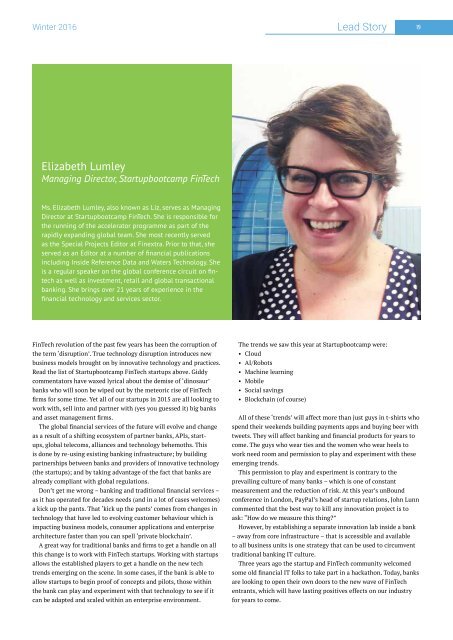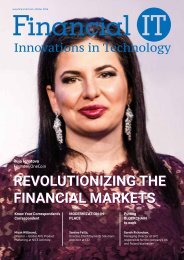Revolutionizing the Financial Markets
Create successful ePaper yourself
Turn your PDF publications into a flip-book with our unique Google optimized e-Paper software.
Winter 2016 Lead Story 19<br />
Elizabeth Lumley<br />
Managing Director, Startupbootcamp FinTech<br />
Ms. Elizabeth Lumley, also known as Liz, serves as Managing<br />
Director at Startupbootcamp FinTech. She is responsible for<br />
<strong>the</strong> running of <strong>the</strong> accelerator programme as part of <strong>the</strong><br />
rapidly expanding global team. She most recently served<br />
as <strong>the</strong> Special Projects Editor at Finextra. Prior to that, she<br />
served as an Editor at a number of financial publications<br />
including Inside Reference Data and Waters Technology. She<br />
is a regular speaker on <strong>the</strong> global conference circuit on fintech<br />
as well as investment, retail and global transactional<br />
banking. She brings over 21 years of experience in <strong>the</strong><br />
financial technology and services sector.<br />
FinTech revolution of <strong>the</strong> past few years has been <strong>the</strong> corruption of<br />
<strong>the</strong> term ‘disruption’. True technology disruption introduces new<br />
business models brought on by innovative technology and practices.<br />
Read <strong>the</strong> list of Startupbootcamp FinTech startups above. Giddy<br />
commentators have waxed lyrical about <strong>the</strong> demise of ‘dinosaur’<br />
banks who will soon be wiped out by <strong>the</strong> meteoric rise of FinTech<br />
firms for some time. Yet all of our startups in 2015 are all looking to<br />
work with, sell into and partner with (yes you guessed it) big banks<br />
and asset management firms.<br />
The global financial services of <strong>the</strong> future will evolve and change<br />
as a result of a shifting ecosystem of partner banks, APIs, startups,<br />
global telecoms, alliances and technology behemoths. This<br />
is done by re-using existing banking infrastructure; by building<br />
partnerships between banks and providers of innovative technology<br />
(<strong>the</strong> startups); and by taking advantage of <strong>the</strong> fact that banks are<br />
already compliant with global regulations.<br />
Don’t get me wrong – banking and traditional financial services –<br />
as it has operated for decades needs (and in a lot of cases welcomes)<br />
a kick up <strong>the</strong> pants. That ‘kick up <strong>the</strong> pants’ comes from changes in<br />
technology that have led to evolving customer behaviour which is<br />
impacting business models, consumer applications and enterprise<br />
architecture faster than you can spell ‘private blockchain’.<br />
A great way for traditional banks and firms to get a handle on all<br />
this change is to work with FinTech startups. Working with startups<br />
allows <strong>the</strong> established players to get a handle on <strong>the</strong> new tech<br />
trends emerging on <strong>the</strong> scene. In some cases, if <strong>the</strong> bank is able to<br />
allow startups to begin proof of concepts and pilots, those within<br />
<strong>the</strong> bank can play and experiment with that technology to see if it<br />
can be adapted and scaled within an enterprise environment.<br />
The trends we saw this year at Startupbootcamp were:<br />
• Cloud<br />
• AI/Robots<br />
• Machine learning<br />
• Mobile<br />
• Social savings<br />
• Blockchain (of course)<br />
All of <strong>the</strong>se ‘trends’ will affect more than just guys in t-shirts who<br />
spend <strong>the</strong>ir weekends building payments apps and buying beer with<br />
tweets. They will affect banking and financial products for years to<br />
come. The guys who wear ties and <strong>the</strong> women who wear heels to<br />
work need room and permission to play and experiment with <strong>the</strong>se<br />
emerging trends.<br />
This permission to play and experiment is contrary to <strong>the</strong><br />
prevailing culture of many banks – which is one of constant<br />
measurement and <strong>the</strong> reduction of risk. At this year’s unBound<br />
conference in London, PayPal’s head of startup relations, John Lunn<br />
commented that <strong>the</strong> best way to kill any innovation project is to<br />
ask: “How do we measure this thing?”<br />
However, by establishing a separate innovation lab inside a bank<br />
– away from core infrastructure – that is accessible and available<br />
to all business units is one strategy that can be used to circumvent<br />
traditional banking IT culture.<br />
Three years ago <strong>the</strong> startup and FinTech community welcomed<br />
some old financial IT folks to take part in a hackathon. Today, banks<br />
are looking to open <strong>the</strong>ir own doors to <strong>the</strong> new wave of FinTech<br />
entrants, which will have lasting positives effects on our industry<br />
for years to come.







